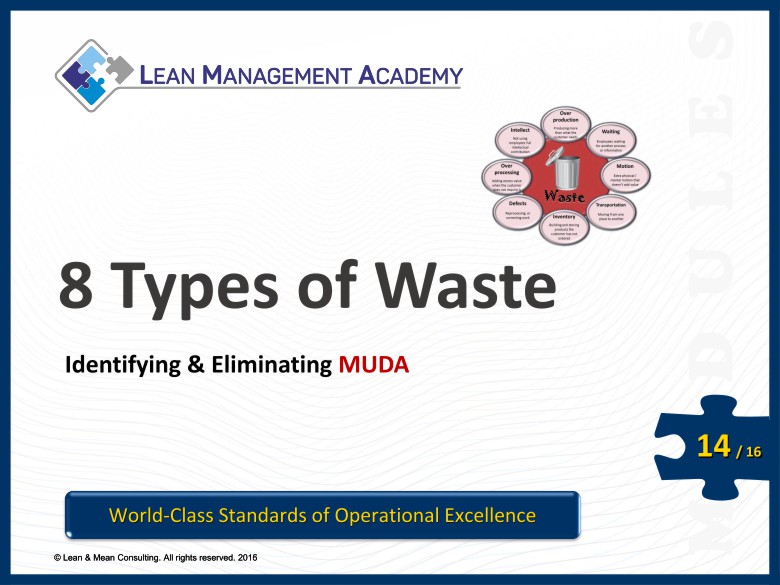Module 14
8 Types of Waste
Enhancing Skills of Identifying & Eliminating MUDA
Description
As early as in the 1950s, Taichii Ohno (Toyota Motor Company) identified and described in detail 7 Main Types of Waste (Japanese word: MUDA). In LEAN methodology, yet another type of waste appeared in the 1990s, which is unused Human Intellect, or the human potential for streamlining.
What purpose did Toyota pursue? By labelling each type of ineffectiveness and identification of places where they can be hidden. This resulted in an opportunity for taking up effective and system-based actions to fight MUDA. Examples of waste, perfectly described, typical places in which it may occur and its evident consequences .This causes rising awareness among both the management and direct labor, obviously on condition that all are appropriately trained in this field.
Module 14 of LEAN Academy provides an excellent opportunity to use this awareness to improve the skills of effective identifying well-hidden MUDA. Identifying its sources and understanding why it gets rooted so easily in our processes. This knowledge is absolutely indispensable for implementing effective methods of loss elimination as well as for improving the quality of standards and discipline.
Recommended Audience
Leaders, managers and LEAN specialists, Process Engineers and wider management staff.
Methodology
Multimedia presentation, short lectures, individual exercises, group activities and discussions and Q&A
Learning Objectives
8 Types of Waste / Identifying and Eliminating MUDA (1 day).
- Presentation of the definition what a loss and waste is.
- Detailed description of the 8 Types of Waste in the processes and management.
- Definition of added value, what does not add value and the operations that do not add value, but which are necessary.
- How waste is getting rooted in our processes?
- How to eliminate the waste effectively? (MUDA Hunting!)
- Getting to know the methods of prevention loss and waste generation.
Tools / Templates / Methods
- MUDA Identification Template. An example of a checklist for identification of the different types of waste during Kaizen workshops or during a Brainstorming session. It is also an excellent exercise for everyone to identify waste, with which they come into contact every day. (this template is included in presentation)

